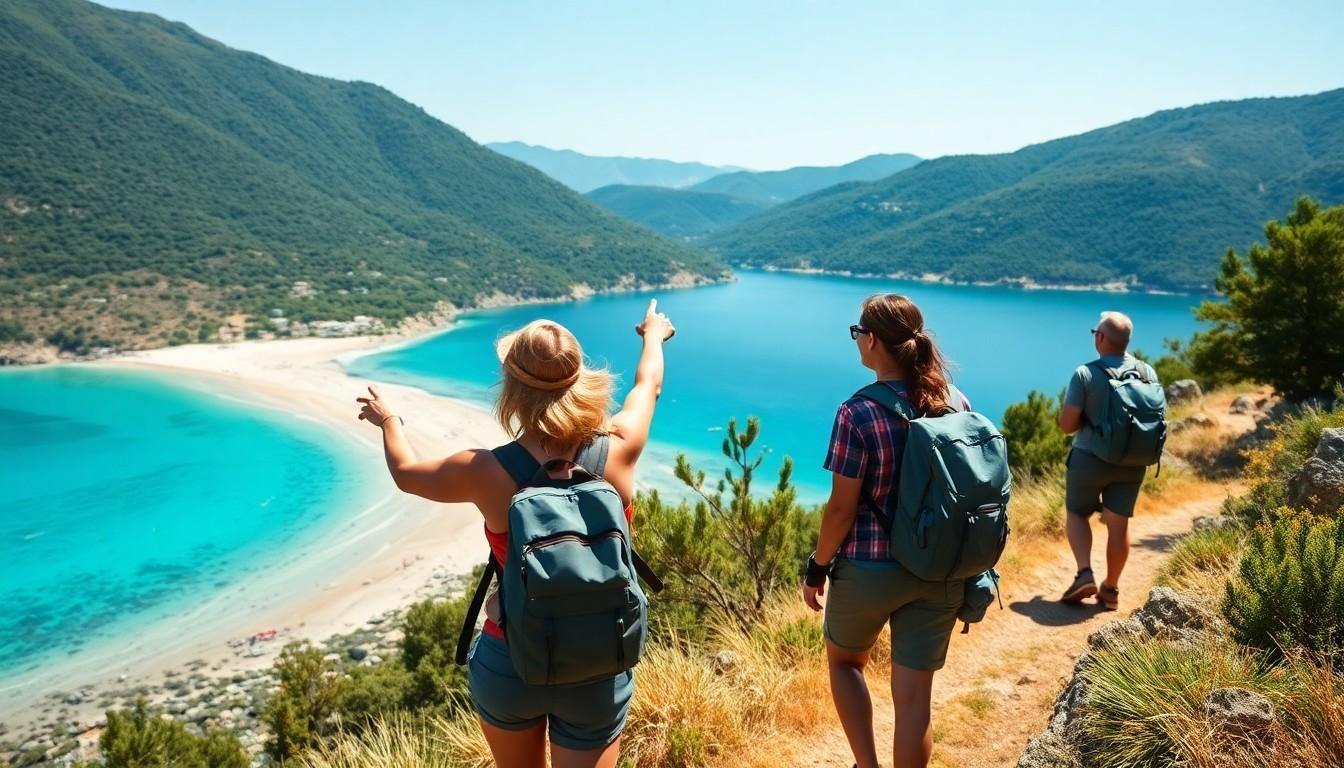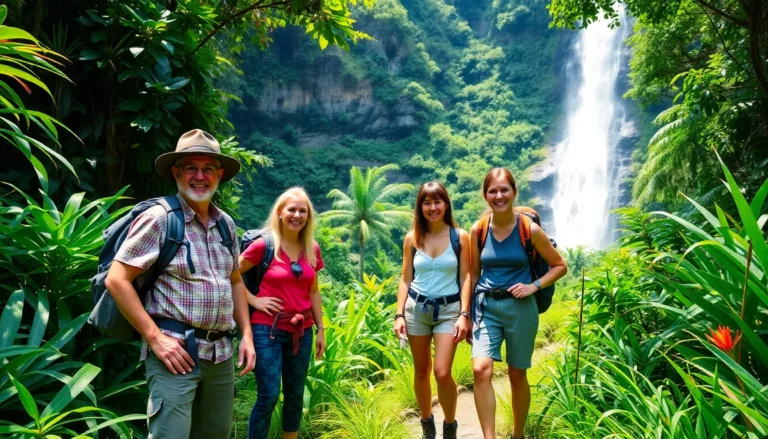Picture this: crystal-clear waters, sun-kissed landscapes, and a rich tapestry of history—all while treading lightly on Mother Earth. Greece, the land of myths and legends, is not just about ancient ruins and delicious moussaka; it’s also a rising star in the eco-tourism scene. With its stunning biodiversity and commitment to sustainable practices, Greece invites travelers to explore its beauty without leaving a hefty carbon footprint.
greece eco-tourism
Greece serves as a prime eco-tourism destination due to its diverse ecosystems and commitment to sustainability. Visitors experience a range of natural attractions, from pristine beaches to mountainous regions and charming villages. This variety fosters opportunities for activities like hiking, bird-watching, and kayaking.
Eco-lodges and boutique hotels across the country emphasize environmentally conscious practices. Many accommodations utilize renewable energy sources and offer locally sourced meals, directly supporting regional economies. Travelers find that these sustainable choices enhance their experience and connection to the local culture.
In addition, Greece promotes responsible tourism practices. Wildlife conservation initiatives showcase the importance of protecting natural habitats and endangered species. Engaging with local communities encourages visitors to learn about traditional practices, further enriching their trips.
Island destinations such as Crete and Kefalonia exemplify eco-tourism in action. Crete features the Samaria Gorge, a UNESCO Biosphere Reserve, which attracts hikers year-round. Kefalonia offers opportunities to explore marine parks, where kayaking and snorkeling reveal vibrant underwater life.
Ultimately, Greece stands out for its ability to blend adventure with sustainability. Travelers enjoy not only breathtaking views but also meaningful interactions with nature and local cultures. This combination enhances the eco-tourism experience, fostering a deeper appreciation for Greece’s natural heritage.
Benefits of Eco-Tourism in Greece

Eco-tourism in Greece promotes sustainability while delivering several benefits to the environment and the economy.
Environmental Conservation
Environmental conservation plays a crucial role in eco-tourism. It fosters protection of Greece’s diverse ecosystems, ensuring preservation of natural resources. Visitors contribute to conservation efforts, often supporting local initiatives directly. Activities like bird-watching and hiking encourage exploration without causing harm to habitats. Local communities engage in sustainable practices, promoting awareness of environmental issues. Eco-lodges also implement plans to reduce waste and utilize renewable energy sources. Integrating conservation education into travel experiences enables deeper connections between tourists and nature. Ultimately, eco-tourism nurtures a healthier environment for future generations.
Economic Growth
Economic growth benefits significantly from eco-tourism in Greece. The industry creates job opportunities, especially in rural areas where traditional employment has declined. Local artisans and businesses thrive as visitors seek authentic experiences and locally sourced products. Eco-tourism helps stimulate the economy, attracting investment in sustainable infrastructure. Increased traveler engagement encourages innovation in sustainable practices, further enhancing economic stability. Data shows that destinations prioritizing eco-tourism experience increased revenue without compromising ecological integrity. This sector promotes balanced growth while fostering community involvement, providing lasting benefits for both residents and visitors.
Popular Eco-Tourism Destinations in Greece
Greece features several eco-tourism destinations known for their natural beauty and commitment to sustainability. Each location offers unique experiences that highlight Greece’s diverse ecosystems and cultural richness.
Crete
Crete ranks as the largest island in Greece and is a prime eco-tourism spot. Visitors appreciate the Samaria Gorge, a UNESCO World Heritage Site, for its stunning trails and diverse wildlife. Excursions often include hiking routes that showcase breathtaking landscapes and endemic plant species. The island also emphasizes local cuisine, with eco-lodges offering farm-to-table dining experiences. Travelers can engage in traditional farming practices, fostering community ties and environmental awareness while exploring pristine beaches.
Peloponnese
Peloponnese presents a rich tapestry of natural attractions, including mountains, forests, and coastal areas. Highlights include the Voidokilia Beach and Parnon Mountain, which provide opportunities for bird-watching and hiking. Local villages encourage visitors to participate in agricultural tours, learning about sustainable farming methods. Concerns for biodiversity drive conservation programs here, benefiting both wildlife and local cultures. Sustainable accommodations often feature organic gardens, allowing guests to experience responsible tourism in action.
Cyclades Islands
Cyclades Islands attract eco-conscious travelers with their unique landscapes and rich marine environments. Santorini’s volcanic terrain and Mykonos’ sandy beaches draw guests seeking adventure and relaxation. Marine parks promote snorkeling and diving, offering a glimpse into vibrant underwater ecosystems. Visitors often explore the islands by traditional sailing boats, reducing carbon footprints. Local artisans showcase sustainable crafts, supporting the economy and cultural heritage while preserving the beauty of these iconic sites.
Activities for Eco-Tourists
Greece offers a variety of activities for eco-tourists, promoting sustainable engagement with its breathtaking landscapes and vibrant culture.
Hiking and Nature Trails
Hiking enthusiasts find Greece’s extensive network of trails an ideal way to connect with nature. Diverse routes across regions like Crete and the Peloponnese reveal stunning vistas, unique flora, and local wildlife. The Samaria Gorge, for instance, attracts trekkers with its dramatic cliffs and rich biodiversity. Exploring these trails contributes to the preservation of natural habitats, emphasizing eco-tourism’s role in conservation. Local guides often share insights on the region’s geology and ecology, enhancing the experience. Participants enjoy invigorating walks under the Mediterranean sun while supporting local economies through guided tours and accommodations.
Sustainable Farming Tours
Sustainable farming tours introduce visitors to Greece’s agricultural practices rooted in tradition. Tourists interact with local farmers and learn about organic methods in regions like Pelion and Crete. Experiences often include harvesting seasonal produce, tasting authentic dishes prepared with fresh ingredients, and understanding the significance of biodiversity. Such tours foster appreciation for sustainable agriculture while promoting environmental stewardship. Engaging with communities strengthens ties and supports local artisans. These unique experiences enhance tourists’ understanding of food systems while reducing their ecological footprint during their travels.
Challenges Facing Greece Eco-Tourism
Greece’s eco-tourism faces several challenges affecting its sustainability and growth.
Environmental Impact
Environmental degradation occurs as tourism increases, with pollution endangering local ecosystems. Coastal areas suffer from plastic waste and marine litter, negatively impacting marine life. Overuse of natural resources such as fresh water strains local communities and habitats. Wildlife disturbance results from unchecked tourism activities, disrupting essential breeding and feeding grounds. Effective measures are crucial to minimize these impacts, ensuring that eco-tourism contributes positively to conservation efforts. Travelers must advocate for responsible practices to preserve the natural beauty they seek to enjoy.
Over-Tourism Issues
Over-tourism presents significant challenges for Greece’s eco-tourism sector. Popular destinations experience excessive visitor numbers during peak seasons, leading to crowding and exhaustion of local resources. Small villages and delicate ecosystems become particularly vulnerable, as the influx of tourists strains infrastructure. Reduced visitor satisfaction is a common result, with travelers seeking tranquil experiences frequently disappointed. Mitigating these issues requires strategic planning to distribute tourist traffic more evenly throughout the country. Sustainable practices can help balance visitor experiences and environmental preservation, enhancing eco-tourism’s long-term viability.
unique blend of adventure and sustainability
Greece’s eco-tourism landscape offers a unique blend of adventure and sustainability that appeals to environmentally conscious travelers. With its stunning natural beauty and commitment to responsible practices, the country encourages visitors to explore its diverse ecosystems while supporting local communities. Engaging in activities like hiking and sustainable farming tours not only enriches the travel experience but also fosters a deeper appreciation for the environment.
As Greece continues to navigate the challenges of over-tourism and environmental degradation, the focus on eco-tourism will play a crucial role in preserving its natural treasures. By prioritizing sustainable practices, Greece can ensure that future generations enjoy its breathtaking landscapes and rich cultural heritage.




